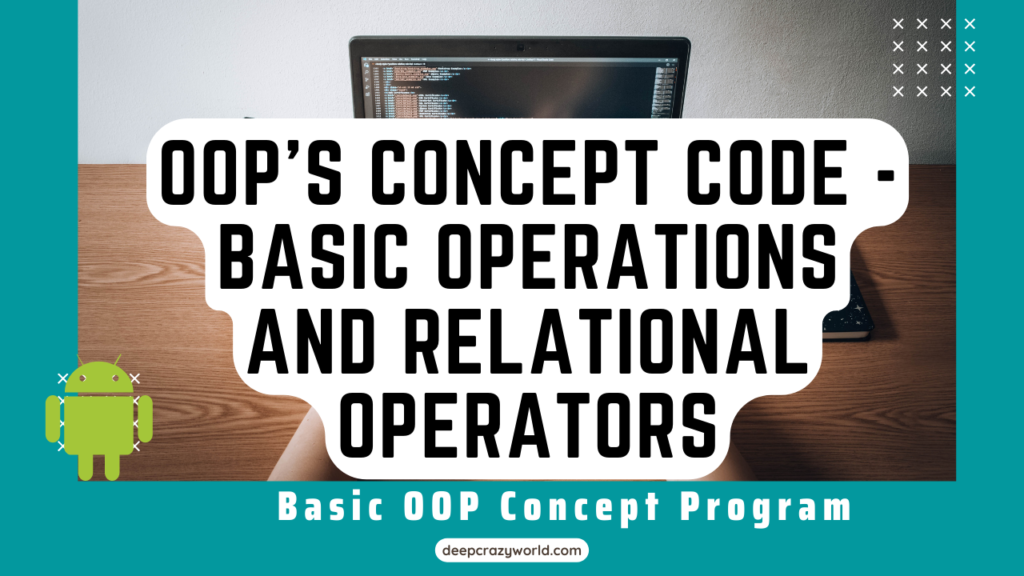OOP’s Concept Code – Basic operations and Relational Operators 2022 – Object means a real-world entity such as a pen, chair, table, computer, watch, etc. Object-Oriented Programming is a methodology or paradigm to design a program using classes and objects. It simplifies software development and maintenance by providing some concepts:
- Object
- Class
- Inheritance
- Polymorphism
- Abstraction
- Encapsulation
Apart from these concepts, there are some other terms which are used in Object-Oriented design:
- Coupling
- Cohesion
- Association
- Aggregation
- Composition

Basic operations
Addition = +
Subtraction "-"
Multiplication "*"
Division "/"
Remainder = "what remains.." 4 % 2 = 0 because 2*2 = 4 and there's not remainder
4%3 = 1Relational Operators
== comparison, not assignment
!= NOT equal
> greater than
< less than
>= Greater than or equal
<= Less than or equalLogical Operators
AND ( && ) == both "sides" need to be TRUE in order for the whole expression to return true
OR ( || )
NOT ( ! )PROGRAM
package com.gohooljava.com;
public class Main {
public static void main(String[] args) {
/*
for loop
while loop
*/
int i = 0;
while (i < 5) {
System.out.println(" Counting.. " + i);
i++;
}
// Make sure to uncomment the code in order to be able to run the program successfully :)
// for (int i = 0; i < 20; i++) {
//
// //remainder ( %)
// if ( i % 4 == 0) {
//
// System.out.println( i + " is a multiple of 4 ");
//
// }
//
//
// }
//Basic operations
//Addition = +
//Subtraction "-"
//Multiplication "*"
//Division "/"
//Remainder = "what remains.." 4 % 2 = 0 because 2*2 = 4 and there's not remainder
// 4%3 = 1
int firstNum1 = 34;
int secondNum2 = 3;
System.out.println("The sum is +" (firstNum1 + secondNum2)); // Always add parenthesis in order for this to work
// the "quotes are placed wrong as it gives the compilation error
//Subtraction
System.out.println("The result is +" (firstNum1 - secondNum2)); // Always add parenthesis in order for this to work
//Multiplication
System.out.println("The result is +" (firstNum1 * secondNum2));
//Division
System.out.println("The result is +" (firstNum1 / secondNum2));
// ==== Relational Operators ===
/*
- == comparison, not assignment
- != NOT equal
- > greater than
- < less than
- >= Greater than or equal
- <= Less than or equal
==== Logical Operators =====
- AND ( && ) == both "sides" need to be TRUE in order for the whole expression to return true
- OR ( || )
- NOT ( ! )
*/
// double firstNum = 10;
// double secondNum = 3;
// double result = 0;
//
// boolean isOld = true;
// boolean isYoung = false;
//
//
// if ( (isOld && !isYoung) && (firstNum < secondNum) ) {
//
// System.out.println("Horray!!");
//
// }else {
//
// System.out.println("Not right!");
//
// }
// result = firstNum % secondNum;
//
// // If statements
// if (firstNum <= secondNum) {
//
//
// System.out.println("The remainder is " + result );
//
// }else {
//
// System.out.println("Numbers aren't equal");
//
// }
}
}